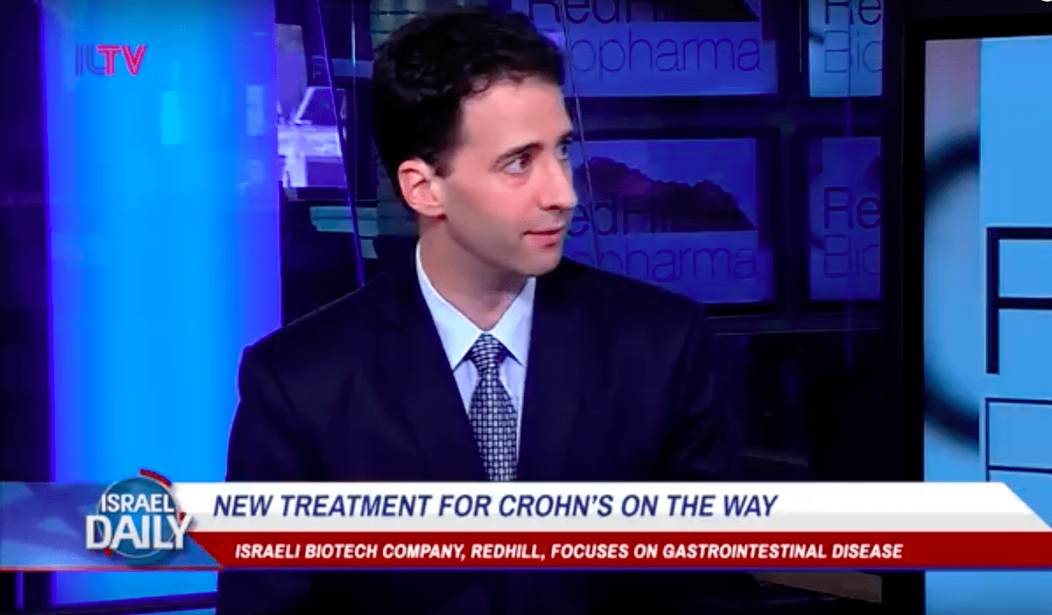On Sunday, an Israeli drug company announced that a cure for Crohn’s disease may be in the works. As results of a massive study on the effectiveness of a potentially life-saving drug come in, RedHill Biopharma has also filed new patents for it in the U.S. and Europe.
“This is a groundbreaking new approach, and if we’re correct this will be a new salvation for patients and for doctors and for everyone affected by this disease,” Guy Goldberg, chief business officer at RedHill, told ILTV Israel on Sunday. “We are right now conducting probably the largest, most robust study ever done with an anti-bacterial approach to treating Crohn’s disease.”
Crohn’s disease is an inflammatory bowel disease in which the body’s immune system attacks the gastrointestinal tract from mouth to anus. Signs and symptoms include abdominal pain, diarrhea, fever, and weight loss, while complications include anemia, skin rashes, arthritis, inflammation of the eye, and tiredness.
The direct cause of the disease remains unknown, but it seems linked to a combination of environmental, immune, and bacterial factors in people with a certain type of genetics. About half of the overall risk is related to genetics, with more than 70 genes involved. Tobacco smokers are twice as likely to develop the disease. There is as yet no cure, and people with Crohn’s disease have a reduced life expectancy.
Approximately 1.5 million people were diagnosed with Crohn’s disease worldwide in 2017, and global sales of Crohn’s disease therapies are estimated to exceed $10 billion in 2018, according to RedHill’s research.
“The current way of treating Crohn’s disease is basically suppressing the body’s entire immune response and that only works for a temporary period of time and it has very serious side effects,” Goldberg explained. “They’re essentially treating the symptoms of the disease and not providing a cure.”
By contrast, RedHill is “trying to address the underlying cause of the disease,” following the theory that it is caused by a bacterial infection involving Mycobacterium avium subspecies paratuberculosis (MAP).
That’s why the RedHill study is so important. The Israeli company is currently conducting a first Phase III study of the drug RHB-104 among Crohn’s disease patients. The last patient in the study completed 26 weeks of treatment in early May 2018, and results from the study are expected in the coming weeks.
The study is a randomized, double-blind, placebo-controlled study evaluating the safety and efficacy of RHB-104 in subjects with moderately to severely active Crohn’s disease. The goal is disease remission, and the study has enrolled 331 patients in the U.S., Canada, Europe, Australia, New Zealand, and Israel.
RedHill received a Notice of Allowance from the U.S. Patent and Trademark Office and an Intention to Grant from the European Patent Office for two new RHB-104 patents, expected to be valid until at least February 5, 2029 if granted, the company announced last week. Additional clinical studies will likely be required to support a U.S. New Drug Application (NDA) for RHB-104. If the study results are positive, RedHill will meet with key leaders and the U.S. Food and Drug Administration (FDA) to push for a speedy approval.
About 800,000 people every year in the U.S. alone are diagnosed with Crohn’s disease, and the disease is spreading in developing countries. In his interview, Goldberg specifically mentioned its spread in Eastern Europe in the former Soviet Union and its growth in post-apartheid South Africa.
The study is nothing short of monumental, as well as groundbreaking. “To put in perspective, this is a project that we’ve spent tens of millions of dollars on, over several years — for a lot of people this is their life’s work,” Goldberg said.
With RHB-104, RedHill aims to bring patients “into remission, so that’s effectively providing a cure for these patients who right now don’t have a lot of good options.”
Watch Goldberg’s interview below.









Join the conversation as a VIP Member